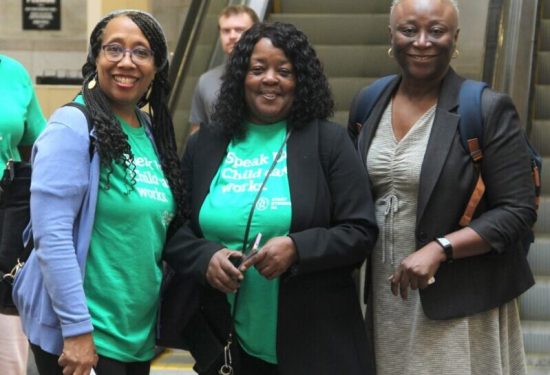This month Home Grown celebrates three years of creating and funding crucial supports for home-based child care. Launched in October 2019, the organization’s collaborative model for innovation and replication has generated life-changing programs and policy initiatives for providers, families, and children across the nation.
Collaboration Sustains Momentum
Unlike most “big bets”—high-risk, high-reward initiatives backed by established funders—Home Grown is structured as a funders collaborative, where funders align their own missions and money behind Home Grown’s initiatives and pool their money to underwrite staffing and administrative costs of the organization. “We’re successful,” says Executive Director Natalie Renew, “because we really work together, learn together, and solve problems together.”
Provider Leadership
Provider voice and leadership are essential to Home Grown’s success. An advisory of seven providers, including both licensed family child care (FCC) and family, friend, and neighbor (FFN) caregivers, keeps the organization grounded in the problems, priorities, and strengths that matter most to providers and families. Additionally, a provider-in-residence, who advises on strategy and program development and co-leads select initiatives, is embedded into the staffing structure of Home Grown.
The open channel between providers and staff also enables the organization to build momentum around key issues, says Renew. “We listen hard to what they need, what they want, what they hope for themselves and for their programs. We’re able to amplify their messages, their desires, and also to build programs and policy initiatives around their goals.”
Home Grown launched the Leading from Home initiative to support provider leaders as they seek to have a voice in policy and decision-making and to grow their local networks of providers and parents. More than 30 provider leaders participate, collaborating with their fellow leaders across the country and provider mentors as they work for positive change for home-based child care.
Innovation Sparks Replicable and Scalable Solutions
Ultimately, the goal of the organization is to be a kind of innovation lab, to test and refine solutions in local networks until they can be replicated and scaled to work on a state or national level. For example:
- Emergency Fund: Just a few months after the organization’s launch, as the pandemic spread and the childcare crisis deepened, Home Grown stepped in to very quickly establish an emergency fund with mechanisms to get funds into the hands of home-based providers who increased their hours and capacity to meet the moment. “We heard back from over 2500 providers who said that those dollars helped them pay for costs they couldn’t have anticipated, but urgently needed to meet—cleaning supplies, masks, food deliveries, and fluctuating income caused by unpredictable closures and quarantines,” says Renew. Home Grown also worked with partners to create the Home-Based Child Care Emergency Fund Replication Toolkit, which other regional funders used to rapidly establish their own funds.
- Building Comprehensive Networks: Building and strengthening comprehensive networks–both informal networks started by providers themselves and networks established by states or nonprofits—is a key strategy for supporting providers. Working through local networks enables national funders to back initiatives they wouldn’t otherwise engage with, according to Ashley Beckner, a founding venture partner at Imaginable Futures. “National funders don’t know about things like the sprinkler codes in Texas, but these are the kinds of things that prevent home-based providers from meeting requirements for licensure that will make them eligible for child care subsidies administered by the state. Home Grown works directly with local organizations to create more access to home-based care and bolster the quality of home-based care.”
- Thriving Providers Project: The recently launched Thriving Providers Project seeks to boost the income of eligible home-based providers through direct cash payments by working with replication partners to design local pilots. “What we know is that in order for children to thrive, the adults that care for them need to thrive too,” says Renew.
- Leading from Home: Home Grown is currently collaborating with several regional partners interested in replicating this provider leadership initiative at the state or local level.
Supporting Family, Friend, and Neighbor Caregivers
Home Grown is a leader in elevating and supporting the work of FFN caregivers. Ruth Evangelista, a home-based provider in Minnesota whose first language is Spanish, is the leader of the network La RED Latina de Educación Temprana in Richfield, Minnesota. La RED Latina was a recipient of the Home Grown emergency funding, the first such funding La RED Latina received. Through her involvement with Home Grown, she and her network of more than 100 providers were able to convince state regulators to include FFNs and home-based providers in benefits previously channeled exclusively to childcare centers. She notes that home-based care is the preferred choice for many Spanish speaking immigrants but “the system doesn’t always work for us.” In Ruth’s three years on Home Grown’s advisory board, the network she leads has gained both strength and recognition as a leading force for change in the child care community.
Programs and Policy Initiatives Are Powered by Story
A key pillar of Home Grown’s work is movement building, lifting the visibility and perception of home-based child care providers. “By telling these stories, Home Grown has illuminated both the value and the struggle—and the value in the struggle— of home-based providers,” says Joan Lombardi, an advisor to philanthropic foundations. “While families sitting around the kitchen table understand how critical child care is to their ability to get to work everyday and participate in the American economy, many of the men who dominate the decision-making process at the national level, still don’t see child care as everybody’s problem. They still see child care as the family’s problem, not the nation’s problem. Home Grown is working to change that through vivid storytelling and smart data curation.”
Home Grown’s website houses a wealth of resources that document both fledgling research and key data about the state of childcare, and home-based care. They send a monthly newsletter that reaches more than 4000 readers, including home-based providers, funders, state administrators, network leaders, policy makers, and advocates. Renew sits on the board of the RAPID Survey Project, which collects and distributes reliable and relevant data about the needs and well-being of the adults in young childrens’ lives. Home Grown’s communications team adds flesh to the bones of the data story by sharing the voices, stories, and wisdom of home-based providers themselves, like Diane Gardner, president of Quality Influential Professionals, a Philadelphia network serving 65 family child care providers that recently gained 501(c)(3) status, with Home Grown’s technical assistance and legal support. Gardner’s final word is a fitting summary of Home Grown’s compassionate, clear-eyed intentions, and its power.
“When you’re just starting a home-based child care business, you learn by baby steps,” she says. “That’s the way I look at Home Grown. They are there to support us as we make our first steps. They cheer us on, they give us resources, they give us access to experts who can support our goals. They have the tools to show us how we can make our organization stand alone, and they help us tell our stories. And yet, if we fall down or make a mistake, they are also there to pick us up and help us get back on our feet—just like we do for our kids.”




